Sir John Monash, Personal Files Book 12, 3 April - 30 April 1916, Part 4
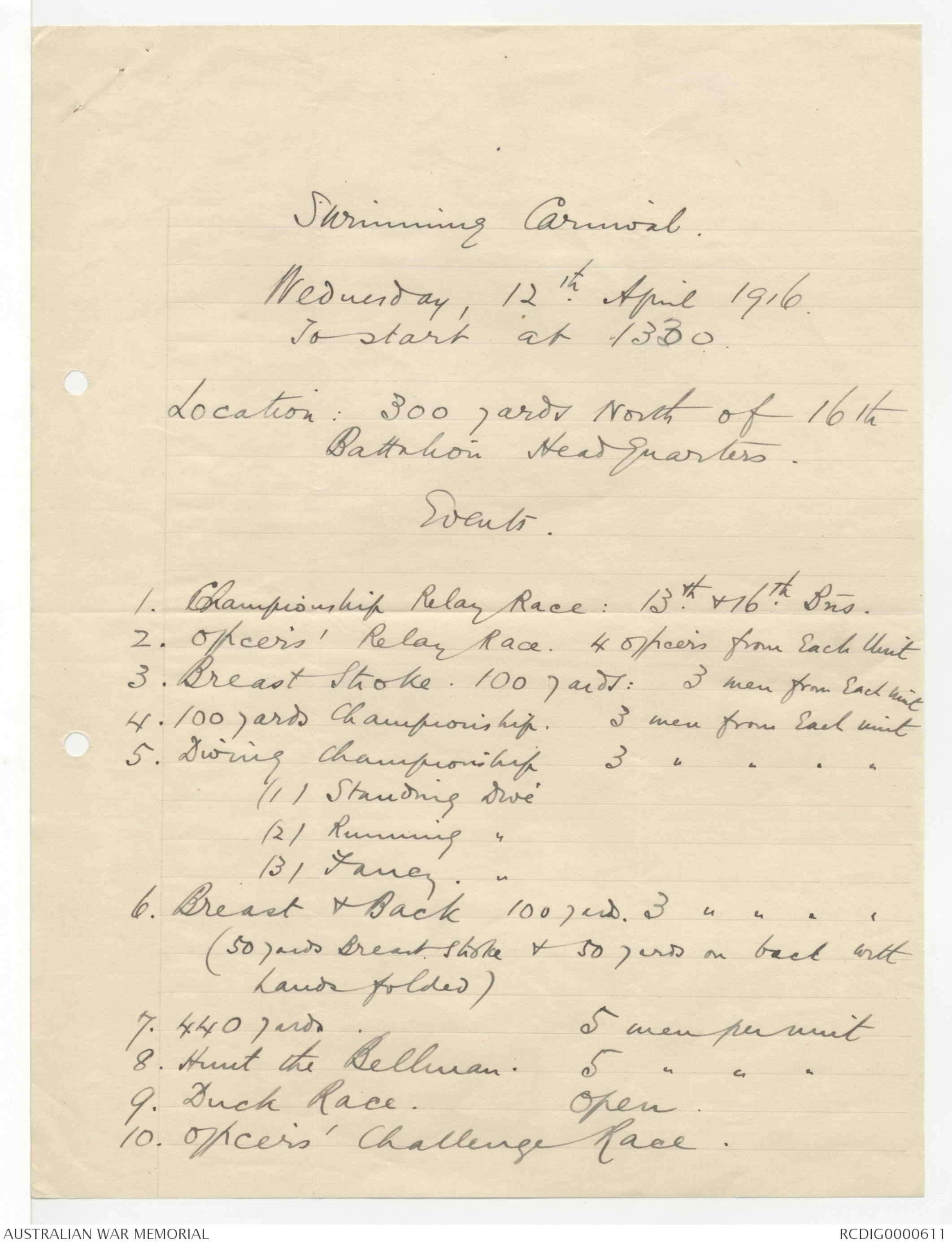
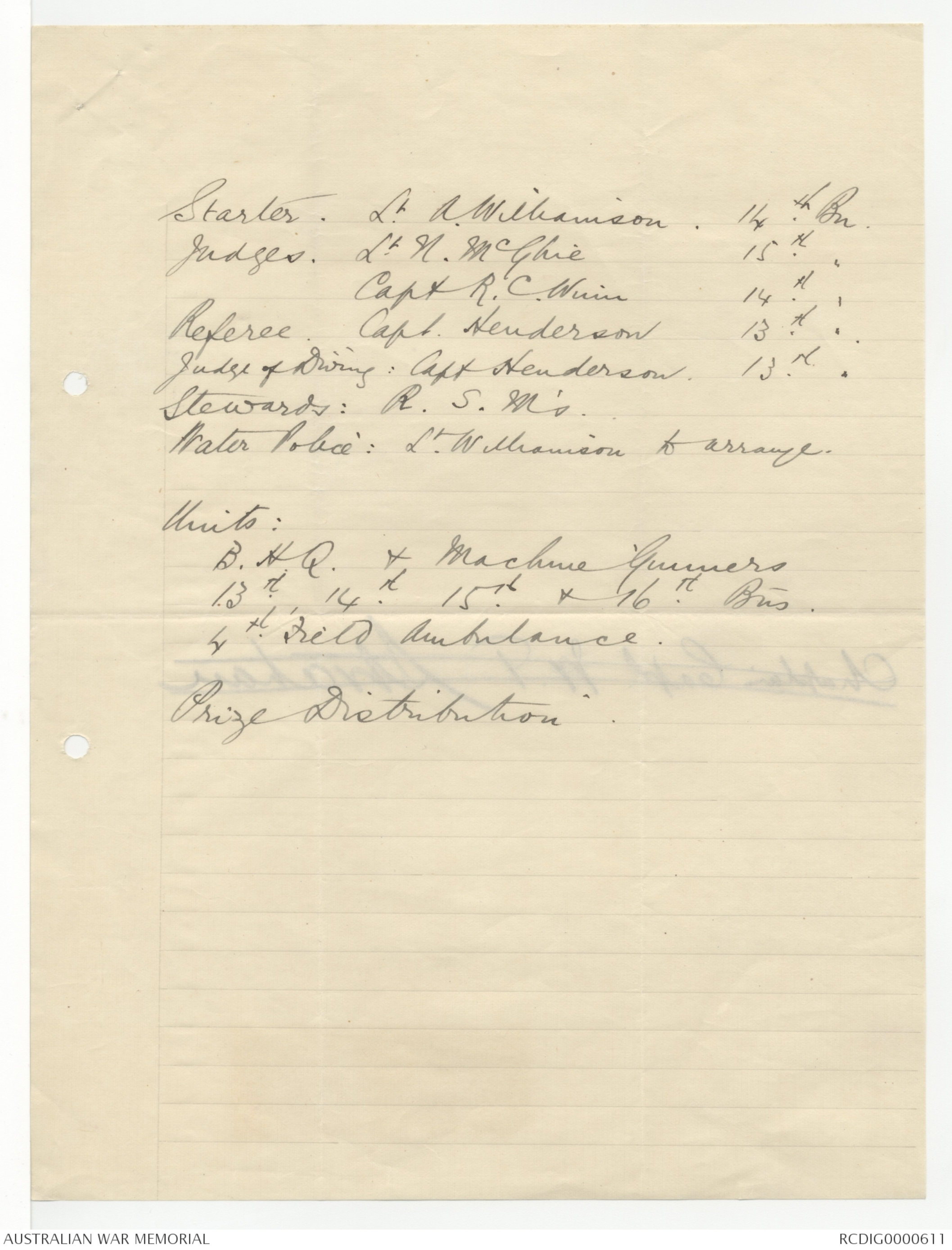
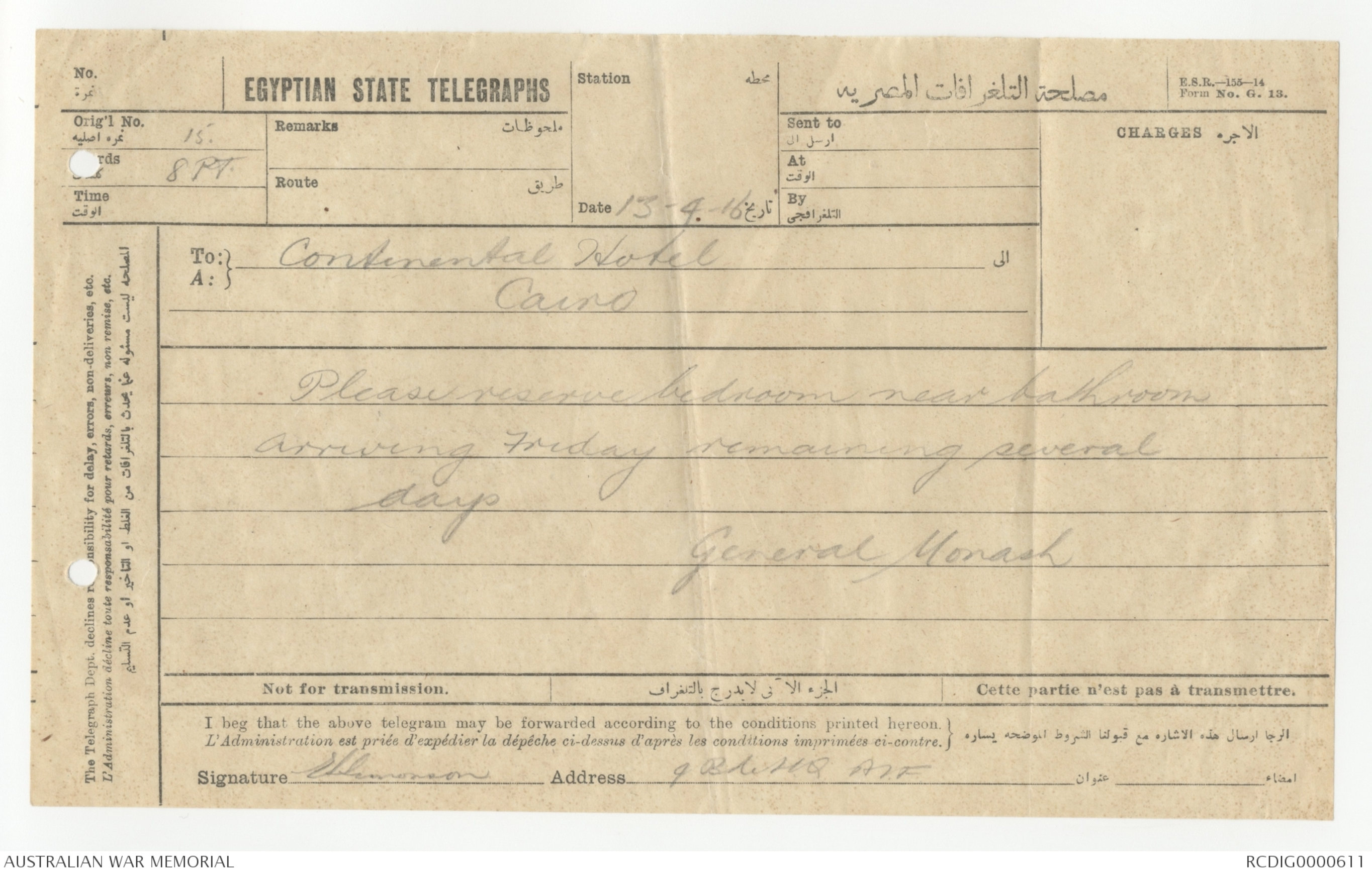
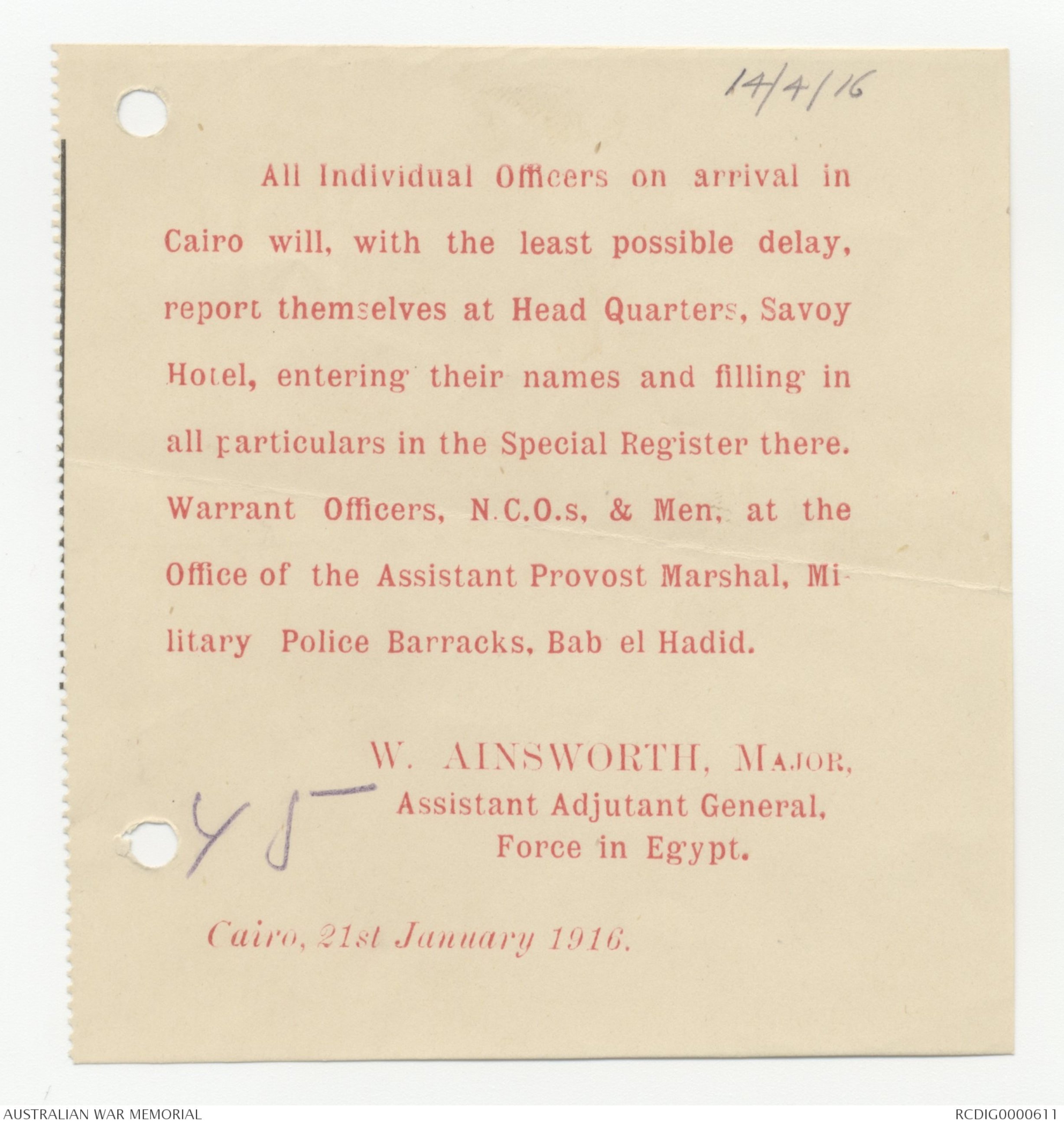
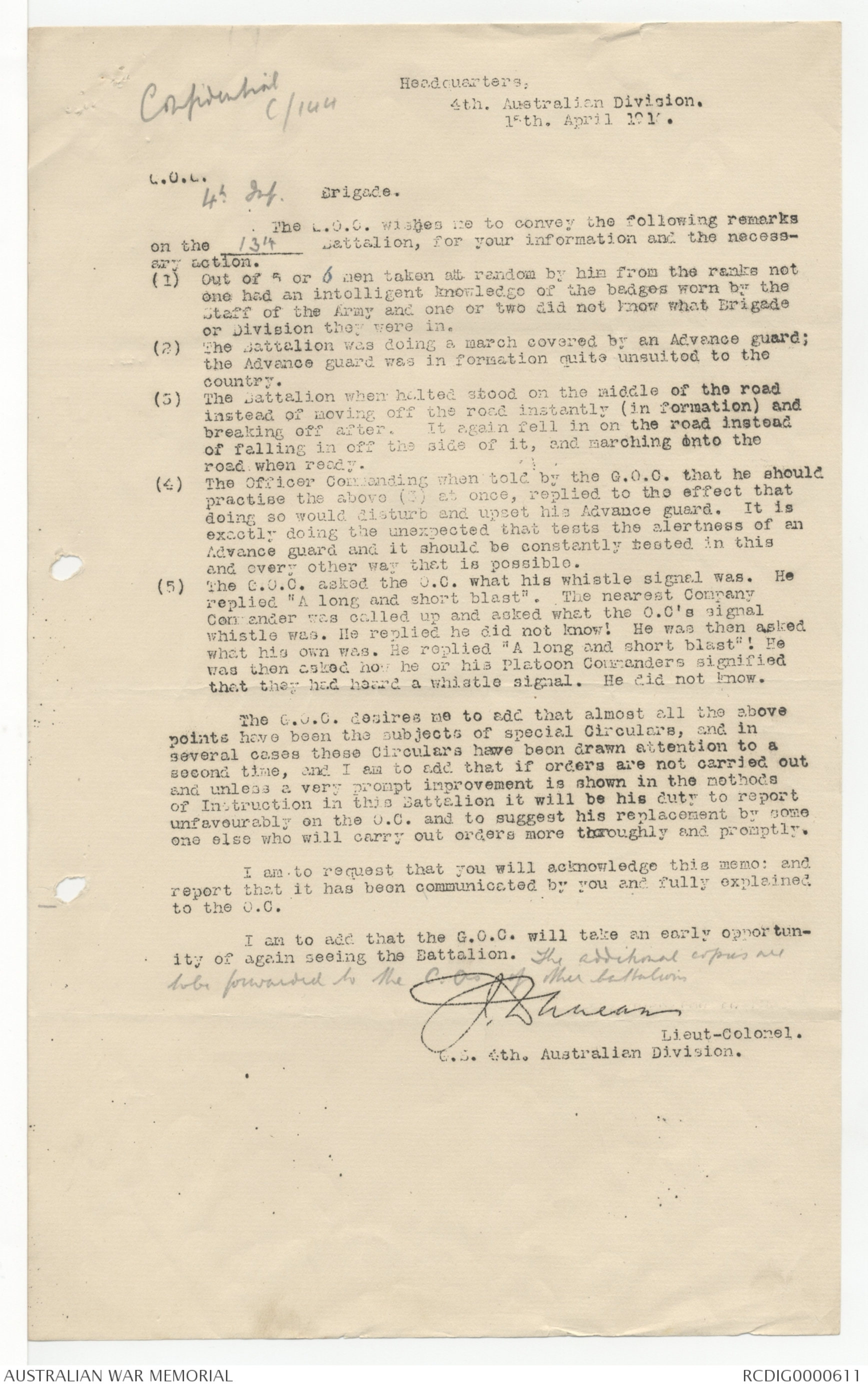
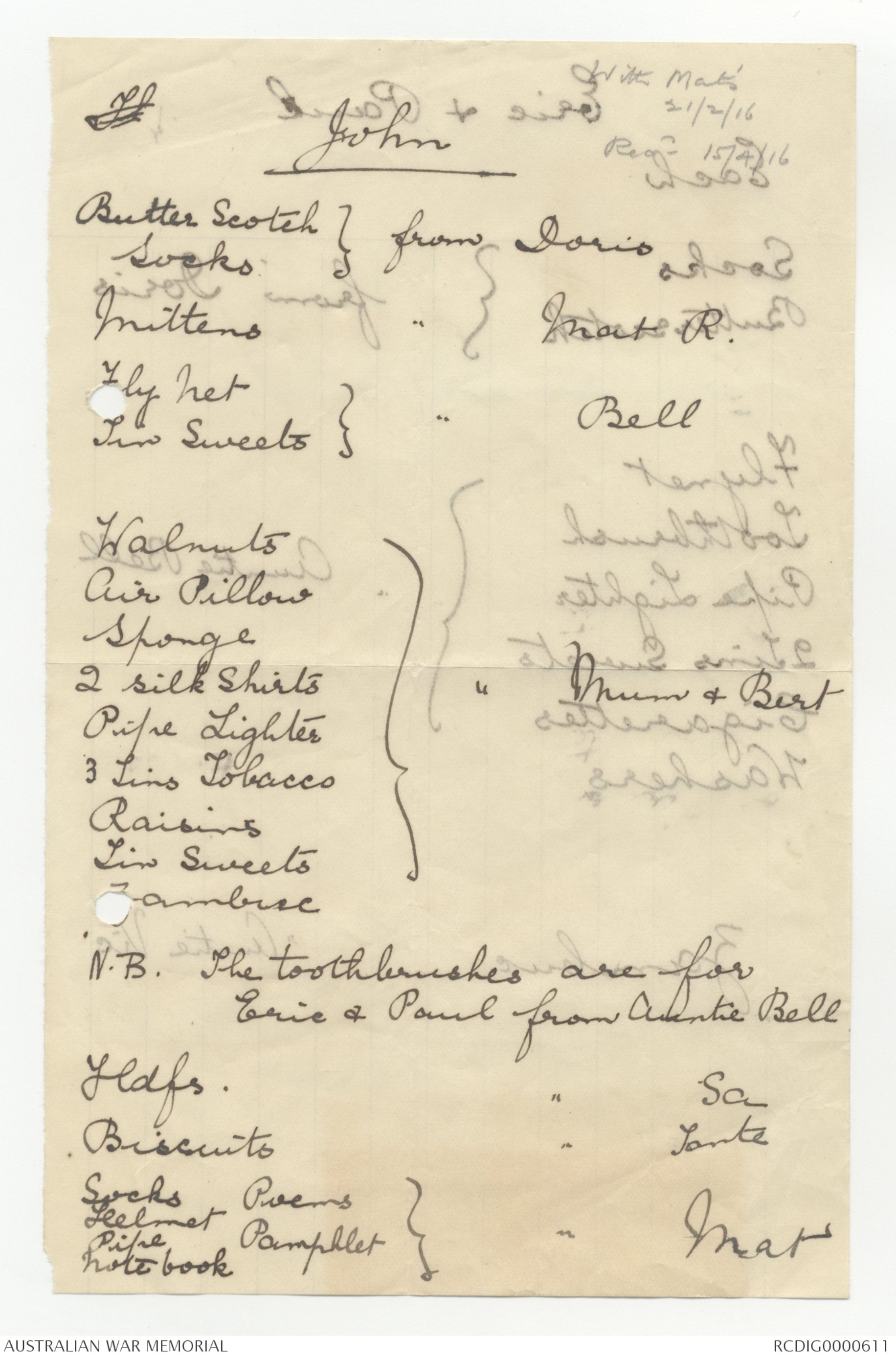
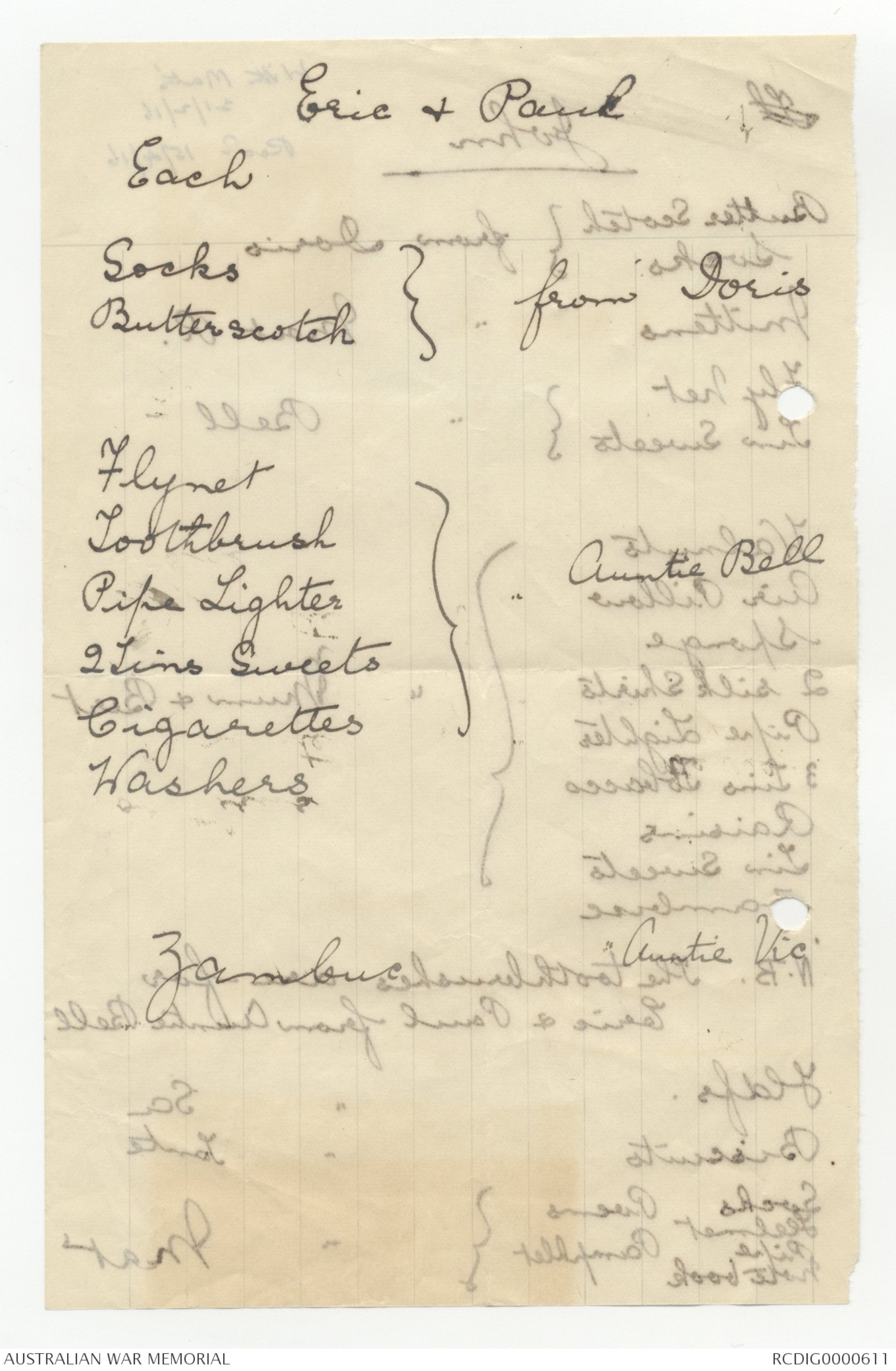
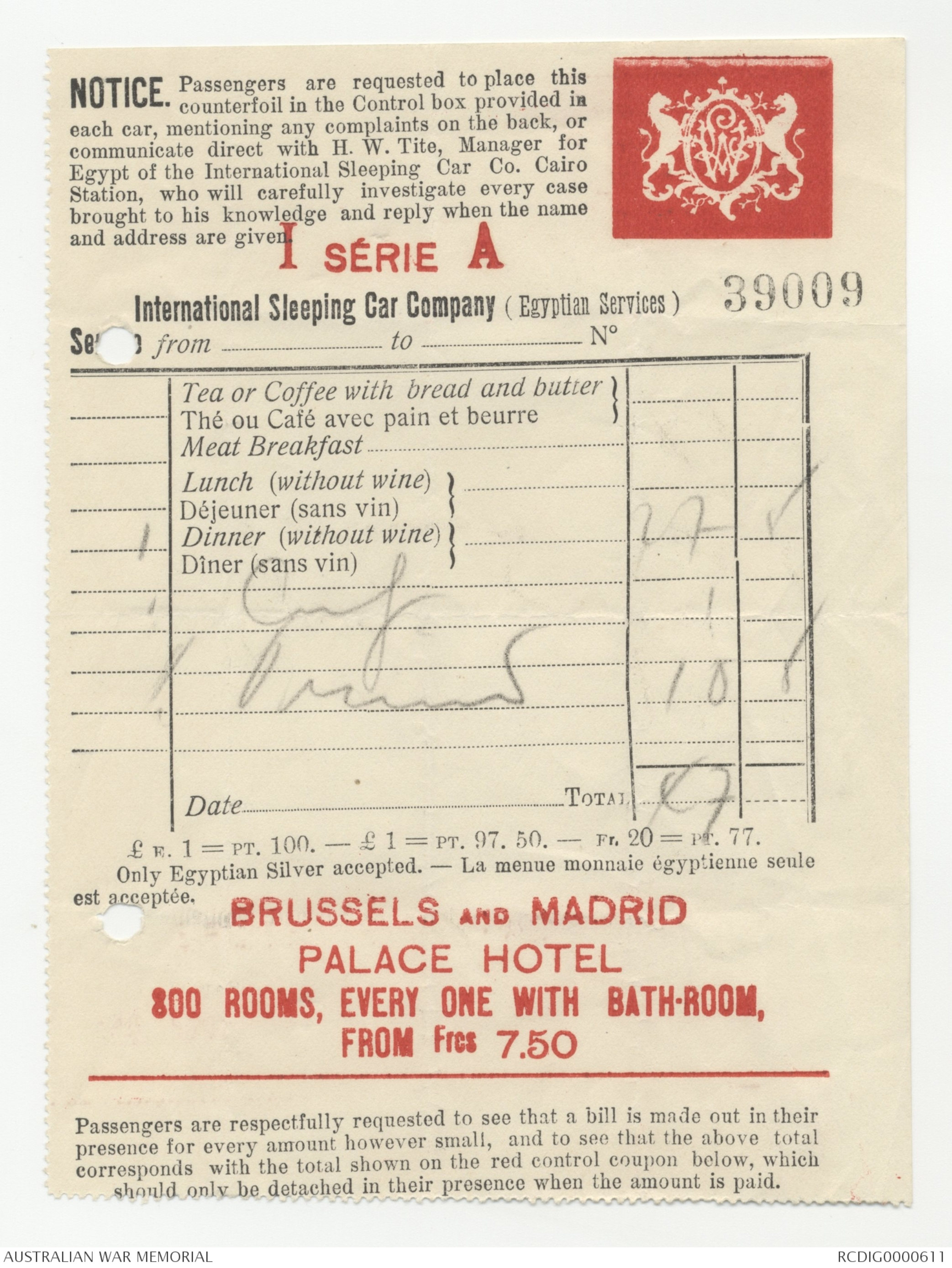
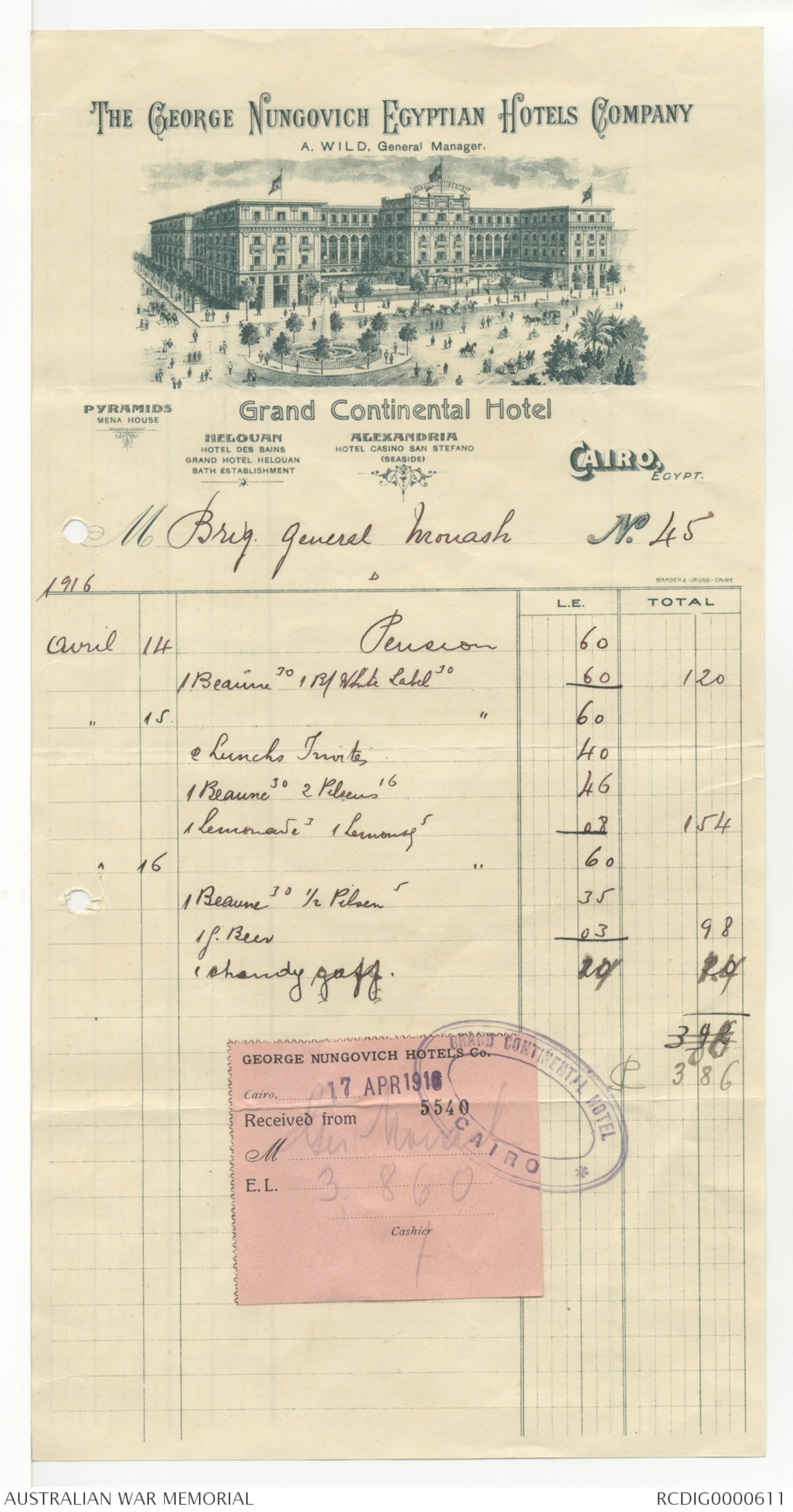
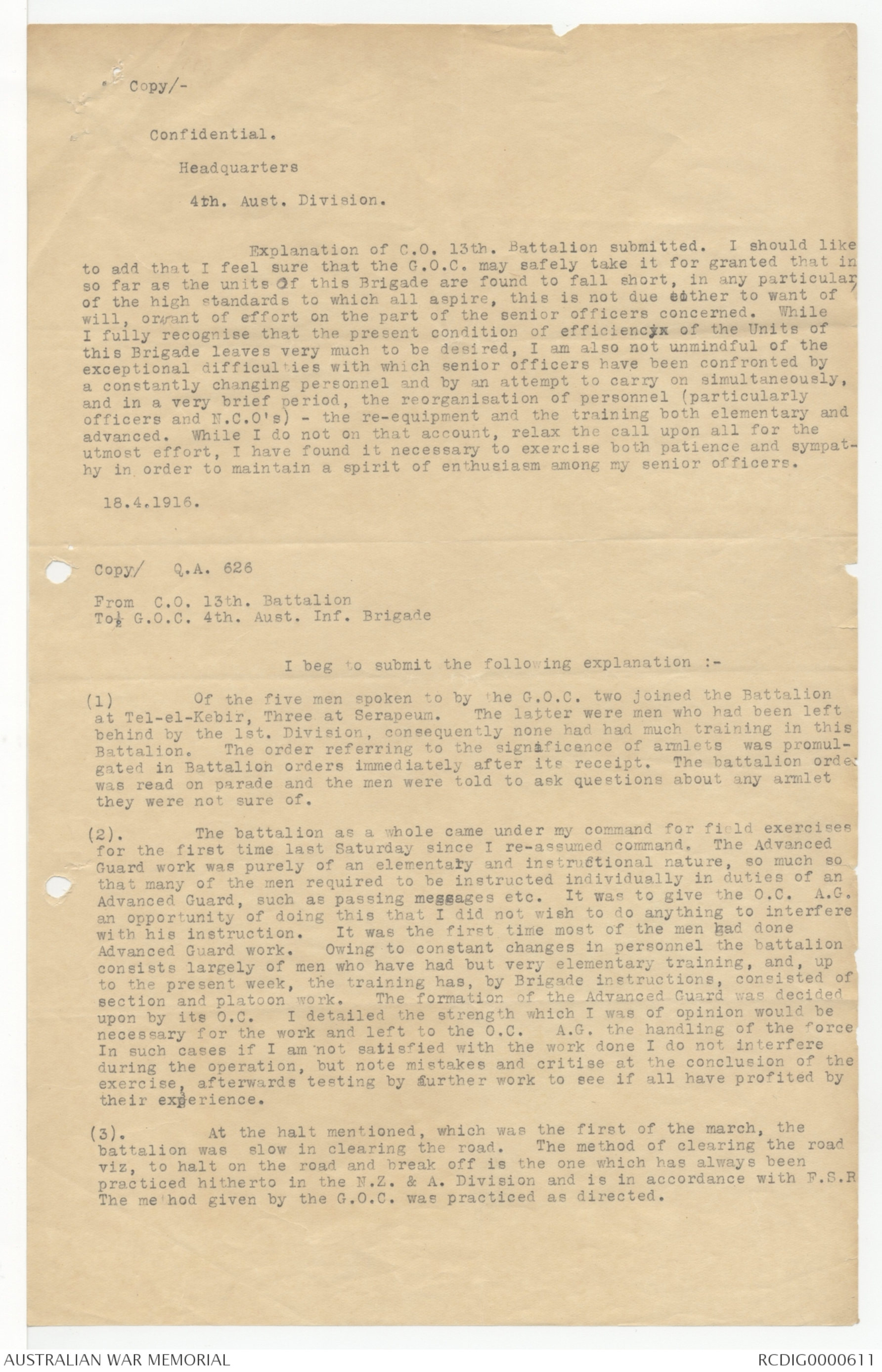
Swimming Carnival.
Wednesday, 12th April 1916.
To start at 1330.
Location: 300 yards North of 16th
Battalion Headquarters.
Events.
1. Championship Relay Race: 13th & 16th Bns.
2. Officers' Relay Race. 4 officers from Each unit
3. Breast Stroke. 100 yards: 3 men from Each unit
4. 100 yards Championship. 3 men from Each unit
5. Diving Championship 3 " " " "
(1) Standing Dive
(2) Running "
(3) Fancy. "
6. Breast & Back 100 yards. 3 " " " "
(50 yards Breast Stroke & 50 yards on back with
hands folded)
7. 440 yards. 5 men per unit
8. Hunt the Bellman. 5 " " "
9. Duck Race. Open.
10. Officers' Challenge Race.
Starter. Lt A. Williamson. 14th Bn.
Judges. Lt N. McGhie 15th "
Capt R. C. Winn 14th "
Referee. Capt. Henderson 13th "
Judge of Diving: Capt. Henderson. 13th "
Stewards: R.S.M's.
Water Police: Lt Williamson to arrange.
Units:
B.H.Q. & Machine Gunners
13th, 14th 15th & 16th Bns.
4th Field Ambulance.
Prize Distribution.
No. EGYPTIAN STATE TELEGRAPHS E.S/R.-155-14
Form No. G. 13.
Orig'l No. 15.
Words 8 PT.
Time
Remarks
Route
Station
Date 13-4-16
Sent to
At
By
CHARGES.
To: Continental Hotel
A: Cairo
Please reserve bedroom near bathroom
arriving Friday remaining several
days
General Monash
Not for transmission. Cette partoe 'est pas ă transmettre
I beg that the above telegram may be forwarded according to the conditions printed hereon.}
Signature ELSimonson Address 4 Bde. HQ AIF
The Telegraph Dept. declines responsibility for delay, errors, non-deliveries, etc.
[*14/4/16*]
All Individual Officers on arrival in
Cairo will, with the least possible delay,
report themselves at Head Quarters, Savoy
Hotel, entering their names and filling in
all particulars in the Special Register there.
Warrant Officers, N.C.O.s, & Men, at the
Office of the Assistant Provost Marshal, Military
Police Barracks, Bab el Hadid.
W. AINSWORTH, MAJOR,
Assistant Adjutant General,
Force in Egypt.
[*Y 5*]
Cairo, 21st January 1916
[*Confidential*]
[*C/144*]
Headquarters,
4th. Australian Division.
15th. April 1916.
G.O.C.
4th Inf. Brigade.
The G.O.C. wishes to convey the following remarks
on the 13th Battalion, for your information and the necessary
action.
1. Out of 5 or 6 men taken at random by him from the ranks not
one had an intelligent knowledge of the badges worn by the
Staff of the Army and one or two did not know what Brigade
or Division they were in.
2. The Battalion was doing a march covered by an Advance guard;
the Advance guard was in formation quite unsuited to the
country.
3. The Battalion when halted srtood on the middle of the road
instead of moving off the road instantly (in formation) and
breaking off after. It again fell in on the road instead
of falling in off the side of it and marching onto the
road when ready.
4. The Officer Commanding when told by the G.O.C. that he should
practise the above (3) at once, replied to the effect that
doing so would disturb and upset his Advance guard. It is
exactly doing the unexpected that tests the alertness of an
Advance guard and it should be constantly tested in this
and every other way that is possible.
5. The C.O.G. asked the O.C. what his whistle signal was. He
replied "A long and short blast". The nearest Company
Commander was called up and asked what the O.C's signal
whistle was. He replied he did not know! He was then asked
what his own was. He replied "A long and short blast"! He
was then asked how he or his Platoon Commanders signified
that they had heard a whistle signal. He did not know.
The G.O.C. desires me to add that almost all the above
points have been the subjects of special Circulars, and in
several cases these Circulars have been drawn attention to a
second time, and I am to add that if orders are not carried out
and unless a very prompt improvement is shown in the methods
of Instruction in this Battalion it will be his duty to report
unfavourably on the O.C. and to suggest his replacement by some
one else who will carry out orders more thoroughly and promptly.
I am to request that you will acknowledge this memo; and
report that it has been communicated by you and fully explained
to the O.C.
I am to add that the G.O.C. will take an early opportunity
of again seeing the Battalion. The additional copies are
to be forwarded to the C.Os of other battalions.
J H Cannon
Lieut-Colonel.
G.S. 4th. Australian Division.
Tl
John
[*With Mat's
21/2/16
Regn 15/4/16*]
|
Butter Scotch } Socks } |
from Doris |
| Mittens | " Mat R. |
|
Fly Net } Tin Sweets } |
" Bell |
|
Walnuts } Air Pillow } Sponge } 2 silk Shirts } Pipe Lighter } 3 Tins Tobacco } Raisins } Tin Sweets } Zambusc } |
" Mum & Bert |
| N.B. | The toothbrushes are for Eric & Paul from Auntie Bell |
| Fldfs. | " Sa |
| Biscuits | " Tante |
|
Socks Poems } Helmet } Pipe Pamphlet } Note book } |
" Mat |
Eric & Paul
| Each | |
|
Socks } Butterscotch } |
" from Doris |
|
Flynet } Toothbrush } Pipe Lighter } 2 Tins Sweets } Cigarettes } Washers } |
" Auntie Bell |
| Zambuc | " Auntie Vic |
International Sleeping Car Company (Egyptian Services) 39009 .
Bill for travel expenses - see original document
THE GEORGE NUNGOVICH EGYPTIAN HOTELS COMPANY
Receipt for hotel expenses - see original document
Copy/-
Confidential.
Headquarters
4th. Aust. Division.
Explanation of C.O. 13th. Battalion submitted. I should like
to add that I feel sure that the G.O.C. may safely take it for granted that in
so far as the units iof this Brigade are found to fall short, in any particular,
of the high standards to which we all aspire, this is not due toeither to want of
will, orwant of effort on the part of senior officers concerned. While
I fully recognise that the present condition of efficiencyx of the Units of
this Brigade leaves very much to be desired, I am also not unmindful of the
exceptional difficulties with which senior officers have been confronted by
a constantly changing personnel and an attempt to carry on simultaneously,
and in a very brief period, the reorganisation of personnel (particularly
officers and N.C.O's)- the re-equipment and training of both elementary and
advanced. While I do not on that account, relax the call upon all for the
utmost effort, I have found it necessary to exercise both patience and sympathy
in order to maintain a spirit of enthusiasm among my senior officers.
18.4.1916.
Copy/ Q.A. 626
From C.O. 13th. Battalion
To½ G.O.C. 4th. Aust. Inf. Brigade
I beg to submit the following explanation :-
(1) Of the 5 men spoken to by the G.O.C. two joined the Battalion
at Tel-el-Kebir, Three at Serapeum. The latter were men who had been left
behind by the 1st. Division, consequently none had much training in this
Battalion. The order referring to the signaificance of the armlets was promulgated
in Battalion orders immediately after its receipt. The battalion order
was read on parade and the men told to ask questions about any armlet
they were not sure of.
(2). The battalion as a whole came under my command for field exercises
for the first time last Saturday since I re-assumed command. The Advanced
Guard work was purely of an elementatry and instructional nature, so much so
that many men required to be instructed individually in duties of an
Advanced Guard, such as passing meggssages etc. It was give the O.C A.G.
an opportunity of doing this that I did not wish to do anything to interfere
with his instruction. It was the first time most of the men ghad done
Advanced Guard work. Owing to the constant changes in personnel the battalion
consists largely of men who have had but very elementary training, and, up
to the present week, the training has, by Brigade instructions, consisted of
section and platoon work. The formation of an Advanced Guard was decided
upon by its O.C. I detailed the strength which I was of opinion would be
necessary for the work and left to the O.C. A.G. the handling of the force
In such cases if I am not satisfied with the work done I do not interfere
during the operation, but note mistakes and criticise at the conclusion of the
exercise, afterwards testing by further work to see if all have profited by
their exgperience.
(3). At the halt mentioned, which was the first on the march, the
battalion was slow in clearing the road. The method of clearing the road
viz, to halt on the road and break off is the one which has always been
practiced hitherto in the N.Z. & A. Division and is in accordance with F.S.R
The method given by the G.O.C. was practiced as directed.
 Deb Parkinson
Deb ParkinsonThis transcription item is now locked to you for editing. To release the lock either Save your changes or Cancel.
This lock will be automatically released after 60 minutes of inactivity.